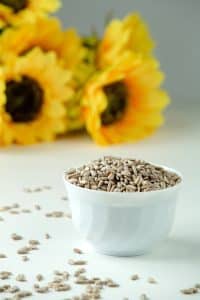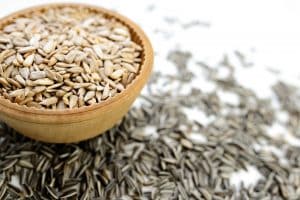
The qualities of sunflower seed
The first traces of domestication of the sunflower can be found in America. The flower is synonymous with sun, light, life, fertility, health and wisdom among the Amerindian tribes. The shelled seeds were first consumed in their raw state, and later ground into flour.
Introduced to Europe in the 16th century by Spanish sailors, the sunflower was first used as a decorative plant. From the 17th century onwards, its seeds were used in cooking, mainly in association with bakery products.
In the 18th century, the Russians discovered that sunflower was not on the list of fats forbidden by the Orthodox Church during Lent and began to use sunflower for its oleaginous qualities.
Today, sunflowers are grown throughout Europe, mainly for the extraction of the oil they contain.

They can also be used as fillings or ingredients in various recipes. They are an integral part of bread preparations and are often found in generous quantities in Sigdal Norwegian crackers.
They boost your mood and energy!
Thanks to the magnesium they contain, which is recognised as an anti-depressant, eating sunflower seeds helps to improve your mood and sense of well-being.
Coupled with magnesium, vitamin B6 contributes to the production of energy and general vitality of the body.
They can help you lose weight
Rich in fibre and protein, which help to promote a balanced diet, and with satiating properties, eating sunflower seeds can help you stick to your diet while providing you with the energy your body needs to function effectively.
They reduce insomnia
The magnesium in sunflower seeds promotes the production of the feel-good hormone serotonin, which actually relaxes the body and makes it easier to sleep.
They calm migraines
Again, thanks to the virtues of magnesium, which helps to calm the nerves and can thus help to get rid of a migraine.
They slow down ageing
Sunflower seeds are rich in vitamin E, known for its moisturising and healing properties on the skin, but also in fatty acids that produce elastin and collagen, which help the skin to stay young and retain its elasticity.
They promote digestion
Sunflower seeds contain about 2 grams of fibre per 30g serving, improving bacterial balance and nutrient absorption.
They cleanse the intestine
Sunflower seeds have vermifuge properties that eliminate
gastrointestinal parasites.
They improve hair suppleness and give it shine
Our hair is nourished and benefits fully from the many nutrients contained in sunflower seeds: zinc, vitamin B, iron, copper, magnesium .... .
They help reduce asthma
Again, it's all thanks to magnesium! Studies have shown that magnesium can slow down the bronchial muscle and improve breathlessness and wheezing.
They strengthen bone health
The combination of magnesium and calcium helps to keep your bones strong. Regular consumption of sunflower seeds thus guarantees the necessary calcium and magnesium intake to prevent your bones from any deficiency and to keep them healthy.
They help to reduce cholesterol
On the one hand, sunflower seeds contain phytosterols which prevent cholesterol from being absorbed by the body. On the other hand, they contain monounsaturated and polyunsaturated fatty acids which naturally reduce the level of cholesterol in the blood.
Eating a small handful of sunflower seeds every day therefore helps people who are trying to reduce their cholesterol level.
They fight diabetes
The nutrients in sunflower seeds help regulate blood sugar peaks and troughs, stabilising insulin levels.
They reduce the risk of heart disease
The vitamin E in sunflower seeds is an antioxidant that protects cell structure, especially in the heart.
Monounsaturated and polyunsaturated fatty acids reduce plaque deposits in the blood vessels.
They reduce the risk of cancer
The many antioxidants, trace elements and vitamins contained in sunflower seeds have been shown to help reduce the stress which, if not properly controlled, contributes to the development of cancer.
The antioxidants contained in sunflower seeds are thought to slow down the growth of cancer cells.
Vitamin E is thought to protect men against prostate cancer. Selenium (an antioxidant) is thought to help prevent breast cancer.
They support the proper functioning of the thyroid gland
One of the main causes of thyroid disorders, including hypothyroidism and hyperthyroidism, is a deficiency of the mineral selenium and iodine. Sunflower seeds contain a high percentage of selenium and iodine, which prevent any risk of dysfunction.
They strengthen the immune system
Eating about 20g of sunflower seeds a day provides your body with 10% of its zinc needs, a mineral that helps to ward off infections, heal wounds and consequently keep your immune system strong and active.
The use of sunflower seeds in Sigdal's Norwegian cracker recipes is therefore justified for all the benefits you will find above.

